| Srl | Item |
| 1 |
ID:
171009
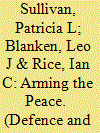

|
|
|
|
|
| Summary/Abstract |
What are the effects of foreign security assistance on the quality of the peace in post-conflict countries? Despite the stakes, and the tremendous amount of weaponry and other forms of foreign military aid flowing to governments of post-conflict countries, the academic literature provides little guidance as to what effects policymakers and practitioners should expect from this type of aid. Military assistance provided to the government of a country emerging from the turmoil of civil war could enable the state to establish a monopoly on the legitimate use of force, leading to a more durable peace and greater human security. However, we contend that significant flows of military aid and weapons from foreign governments may encourage regimes to adopt more repressive approaches to governance. We investigate the impact of security assistance on human rights conditions after 171 internal armed conflicts that ended between 1956 and 2012 using a novel measure of military aid and an instrumented measure of weapons transfers. We find strong evidence that both military aid and arms transfers to post-conflict governments increase state repression.
|
|
|
|
|
|
|
|
|
|
|
|
|
|
|
|
| 2 |
ID:
184431
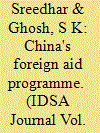

|
|
|
| 3 |
ID:
192037
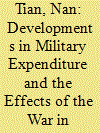

|
|
|
|
|
| Summary/Abstract |
This article presents on trends in military spending, building on the most recent military expenditure data by the Stockholm International Peace Research Institute (SIPRI). World military spending grew for the eighth consecutive year in 2022, up 3.7 per cent to an all-time high of $2240 billion. The increase in world spending in 2022 was largely due to three factors: Russia’s invasion of Ukraine; the increase in military spending by Central and Western Europe countries as a reaction to the invasion and expenditure rises in major powers in Asia, namely China, India and Japan. There were two major military expenditure related developments in 2022 linked to the war in Ukraine. Firstly, Central and Western European responded to the deteriorating security situation by announcing plans to substantially increases their military spending. Some of the acutest increases in military spending took place in countries with close geographical proximity to Russia and Ukraine. Secondly were the immediate and record levels of military aid sent to Ukraine. Based on official figures for the largest donors and other assistance funds, at least $30 billion worth of military aid was given to Ukraine in 2022, with the US as the largest provider accounting for around two-thirds of all military aid
|
|
|
|
|
|
|
|
|
|
|
|
|
|
|
|
| 4 |
ID:
122258
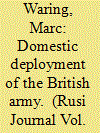

|
|
|
|
|
| Publication |
2013.
|
| Summary/Abstract |
Military Aid to the Civil Power has been employed sparingly, with the exception of Northern Ireland and some niche commitments, for much of the last decade, yet the requirement for it remains. Western democracies such as the UK maintain the ability to deploy their troops on home soil as a last resort, when civilian authorities are overwhelmed or exhausted. The riots of August 2011, for example, prompted calls for the deployment of the army. Marc Waring examines whether the army is still the most appropriate force to assist the police in extremis public-order situations or whether it is time to establish a 'third force', sitting between the police and the army.
|
|
|
|
|
|
|
|
|
|
|
|
|
|
|
|
| 5 |
ID:
050369
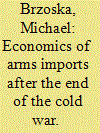

|
|
|
| 6 |
ID:
069854
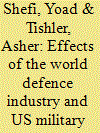

|
|
|
| 7 |
ID:
141431
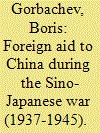

|
|
|
|
|
| Summary/Abstract |
The author characterizes the significance of military aid to China from the U.S.S.R. and the U.S.A. during the Sino-Japanese War (1937-1945). He describes the forms of Soviet military assistance in the Chinese people's straggle against the Japanese aggressor at various stages of World War II, and analyzes U.S. military supplies to China under Lend-Lease.
|
|
|
|
|
|
|
|
|
|
|
|
|
|
|
|
| 8 |
ID:
062816
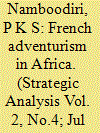

|
|
|
| 9 |
ID:
124879
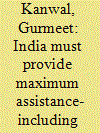

|
|
|
|
|
| Publication |
2013.
|
| Summary/Abstract |
Ensuring that there is peace and stability in Afghanistan is of vital national interest for India. It is a country with which India has traditionally enjoyed warm and friendly relations. Since the overthrow of the Taliban regime in 2001-02, India has contributed immensely to the international reconstruction effort in Afghanistan. It has spent over US $2.0 billion in constructing the Delaram-Zaranj highway, building and running schools and hospitals, and in training the fledgling Afghan administration.
|
|
|
|
|
|
|
|
|
|
|
|
|
|
|
|
| 10 |
ID:
128390
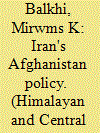

|
|
|
|
|
| Publication |
2011.
|
| Summary/Abstract |
The financial assistance of Iranian authorities to the President of Afghanistan Hamid Karzai in October 2010, has once again sparked the discussion on Iranian policy towards Afghanistan. The fable of "money envelopes" which was delivered by Islamic Republic of Iran by non- diplomatic means remains a hot topic both inside and outside Afghanistan. llamid Karzai confirmed at a press conference that his chief of office receives cash between five to seven hundred thousand Euros: twice each year from Iran. Though the President of Afghanistan clari?ed that this controversial so called financial aid has been part of the' international financial support in which Iran is involved in the post- Taliban reconstruction of Afghanistan, his reply could not convince the- analysts who are experts on Iran and Afghanistan policies. The main reason that the issue became controversial has been theonedia propaganda related to this issue in which Iran is accused of providing military aid and financial support to the Taliban in Afghanistan. The seizure of two thousand oil tankers by Iranian government which resul - _ in a large anti-Iranian demonstration in Kabul against the Iran emba _ highlighted the issue. Few months before, in March 2010, Irani President Mahmud Ahmadinezhad during his visit to Kabul emphas' - y. Iran's disagreement over the presence of NATO in Afghanistan. He sai to regional peace."
|
|
|
|
|
|
|
|
|
|
|
|
|
|
|
|
| 11 |
ID:
121477


|
|
|
|
|
| Publication |
2013.
|
| Summary/Abstract |
During the 1960s, Iran transitioned from a client state into an emerging partner of America. Crucial to the analysis of this transformation is understanding how Iran progressed from a low-priority military aid recipient in the 1950s to a military credit purchase partner in 1964. The transformation was characterized by frequent difficulties and disagreements as the Shah's demands and Washington's ability and/or desire to fulfill those demands rarely coalesced until the twilight of the Johnson Administration.
|
|
|
|
|
|
|
|
|
|
|
|
|
|
|
|
| 12 |
ID:
176950
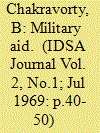

|
|
|
| 13 |
ID:
184440
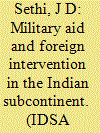

|
|
|
| 14 |
ID:
152858
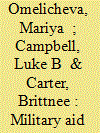

|
|
|
|
|
| Summary/Abstract |
MARIYA OMELICHEVA, BRITTNEE CARTER, and LUKE B. CAMPBELL assess the relationship between U.S. security assistance programs and the degree to which foreign militaries respect civilian human rights in times of political instability. They conclude that these programs do not have a uniform impact on human rights practices in the states that receive U.S. military aid. Rather, the relationship is contingent upon various factors, primarily whether security assistance programs include an educational and training component.
|
|
|
|
|
|
|
|
|
|
|
|
|
|
|
|
| 15 |
ID:
129159
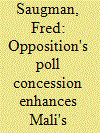

|
|
|
| 16 |
ID:
063118
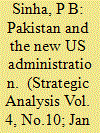

|
|
|
| 17 |
ID:
167186
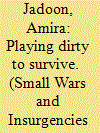

|
|
|
|
|
| Summary/Abstract |
U.S. military aid provides recipient governments the fighting capability they require to undermine domestic militant groups, which can undermine groups’ leadership structures and trigger group splintering. In this environment, brutal attacks against non-combatants become an effective mechanism for targeted groups to signal their resolve and outbid competitors. A large-n analysis of U.S. military aid between 1989 -2011 links higher levels of military aid with higher levels of rebel-perpetrated civilian killings, and deaths due to explosive attacks on non-combatant targets. A closer examination of the case of Pakistan sheds further light on the underlying causal mechanisms.
|
|
|
|
|
|
|
|
|
|
|
|
|
|
|
|
| 18 |
ID:
177823
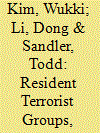

|
|
|
|
|
| Summary/Abstract |
This paper revisits moral hazard associated with military aid given to host countries to eliminate their resident terrorist groups. This conflict aid presents recipient countries with perverse incentives because the aid ends once resident groups are removed. In the case of US aid recipients, the longevity of resident terrorist groups rose dramatically. The current article improves on the empirics of the pioneering article by showing that the moral-hazard concerns extend to other major donors – the United Kingdom, France, and Germany. Additionally, military assistance given by a collective of countries to host countries greatly reduces the moral hazard but does not eliminate it. Moreover, policy alignment or affinity between a major donor and the host aid-recipient country does not generally augment resident terrorist groups’ survival, except marginally for the United States, when other sources of military aid are allowed. We introduce other empirical and conceptual innovations for analyzing military-aid-induced moral hazard.
|
|
|
|
|
|
|
|
|
|
|
|
|
|
|
|
| 19 |
ID:
192614
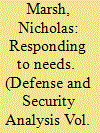

|
|
|
|
|
| Summary/Abstract |
The article analyses the provision of military aid to Ukraine during the first year after the 2022 Russian invasion and explains why it was more effective compared to other examples. It discusses the impact of material and intangible military assistance. The article examines tensions arising from principal-agent relationships between Ukraine and the states that provided support that may have affected what was provided and when it was delivered. It is notable that providers of assistance emphasised equipment rather than training, a choice that could be made because Ukraine had already built up a high level of combat skills and military organisation. The article argues that the distinctive aspects of military assistance to Ukraine that led to its impact were the quality and quantity of equipment provided, good communication and co-ordination between Ukraine and those states providing assistance, and that Ukrainian defence and government institutions could manage the aid provided.
|
|
|
|
|
|
|
|
|
|
|
|
|
|
|
|
| 20 |
ID:
053913
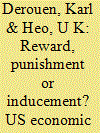

|
|
|